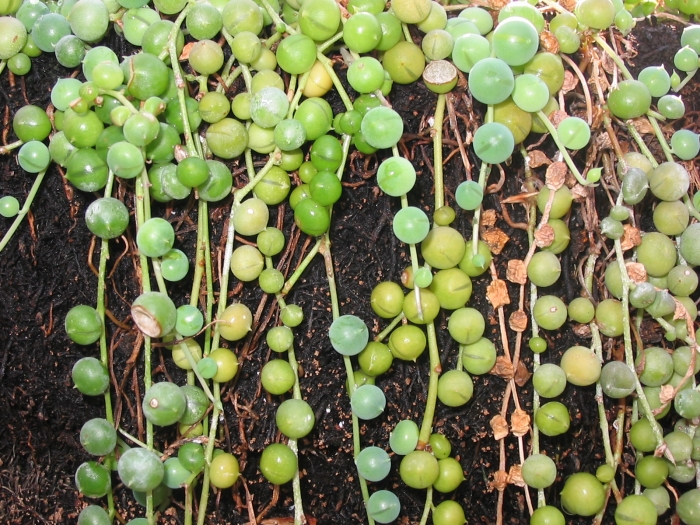String Of Pearls
(Senecio rowleyanus)
String Of Pearls (Senecio rowleyanus)
/
/

Alberto Salguero assumed
CC BY-SA 3.0
Image By:
Alberto Salguero assumed
Recorded By:
Copyright:
CC BY-SA 3.0
Copyright Notice:
Photo by: Alberto Salguero assumed | License Type: CC BY-SA 3.0 | License URL: http://creativecommons.org/licenses/by-sa/3.0/ | Uploader: Alberto Salguero | Publisher: Wikimedia Commons | Title: Senecio_rowleyanus.jpg | Notes: |






























Estimated Native Range
Summary
Senecio rowleyanus, commonly known as String of Pearls, is an evergreen perennial succulent vine, native to the arid regions of southwest Africa. In its natural habitat, it thrives in rocky outcroppings and dry river valleys, where its stems trail on the ground, rooting where they touch to form dense mats. This succulent typically has trailing stems that can grow 2–3 feet (60–90 cm) long. The spherical leaves are an adaptation to conserve water in arid environments, minimizing surface area exposed to the dry air. String of Pearls blooms in summer with clusters of small, trumpet-shaped white flowers about 13mm in diameter, featuring colorful stamens and emitting a cinnamon-like fragrance. The flowers are moderately showy and last about a month.
String of Pearls is valued for its unique, bead-like foliage and is often used in hanging baskets to showcase its cascading growth habit. It is a popular choice for indoor cultivation due to its low maintenance requirements and interesting appearance. While it can tolerate some outdoor conditions, it must be protected from freezing temperatures. This plant requires infrequent watering, a few hours of direct sunlight, and is not particularly sensitive to humidity levels. Sandy, well-draining soil is crucial to avoid root rot. Propagation is straightforward: cut or pinch off a healthy stem tip, lightly cover it with moist potting mix, and roots will form at the leaf nodes. In cultivation, it does best in full sun to part shade, with very low water needs, and in soils with fast drainage. Despite its easy care, overwatering is a common issue that can lead to root rot, and mealybugs may infest the plant if grown indoors.CC BY-SA 4.0
String of Pearls is valued for its unique, bead-like foliage and is often used in hanging baskets to showcase its cascading growth habit. It is a popular choice for indoor cultivation due to its low maintenance requirements and interesting appearance. While it can tolerate some outdoor conditions, it must be protected from freezing temperatures. This plant requires infrequent watering, a few hours of direct sunlight, and is not particularly sensitive to humidity levels. Sandy, well-draining soil is crucial to avoid root rot. Propagation is straightforward: cut or pinch off a healthy stem tip, lightly cover it with moist potting mix, and roots will form at the leaf nodes. In cultivation, it does best in full sun to part shade, with very low water needs, and in soils with fast drainage. Despite its easy care, overwatering is a common issue that can lead to root rot, and mealybugs may infest the plant if grown indoors.CC BY-SA 4.0
Plant Description
- Plant Type: Succulent, Vine
- Height: 1-2 feet
- Width: 1-2 feet
- Growth Rate: Moderate
- Flower Color: Cream, White
- Flowering Season: Spring
- Leaf Retention: Evergreen
Growth Requirements
- Sun: Full Sun, Part Shade
- Water: Very Low, Low
- Drainage: Fast
Common Uses
Bee Garden, Drought Tolerant, Fragrant, Groundcover, Potted Plant, Rabbit Resistant
Natural Habitat
native to the arid regions of southwest Africa
Other Names
Common Names: String-Of-Beads
Scientific Names: , Senecio rowleyanus,
GBIF Accepted Name: Senecio rowleyanus M.Jacobs, 1968